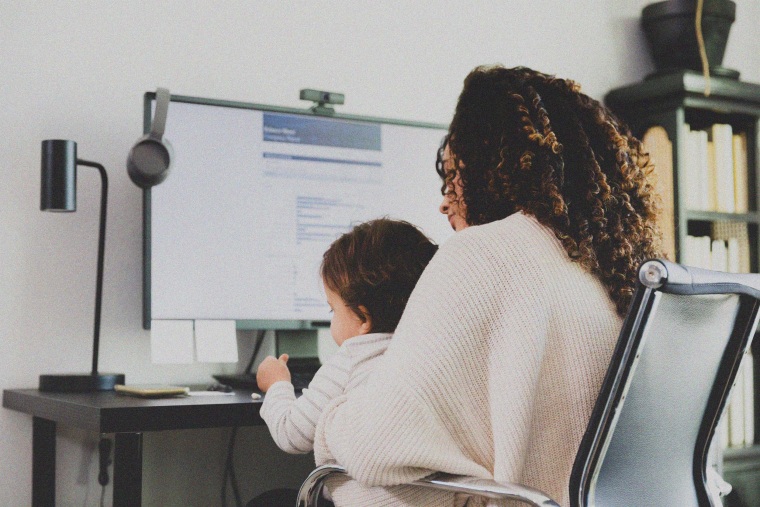On Sept. 30, the Child Care Stabilization program — which helped more than 80% of child care facilities stay open through the pandemic — is slated to end. Three million kids are at risk of losing their spots, which means millions of moms may once again be forced to trade paid work for unpaid care — costing families some $9 billion in lost wages.
In America, this so-called ‘child care cliff’ isn’t a new frontier — moms have been teetering on its edge for decades. And if this relief cuts off, it will confirm what many of us already know: Working moms are both the first ones pushed off the ledge, and the social safety net expected to catch everyone else, often at our own peril.
Over the past few months, moms have truly done the impossible: not just rebounding to pre-pandemic workforce numbers, but surpassing them. Just last month, we saw record numbers of working moms with young kids, and a record low gap between men and women in the workforce.
It’s no coincidence that our economy continues to make gains, too. Our return to the workforce has brought with it the lowest unemployment rate in five decades, renewed growth in consumer spending, and has even served to counter inflation.
No one expected moms to be the force behind these gains. After all, this recovery would have already been momentous even if the pandemic hadn’t forced roughly 2 million women out of the workforce; even if women hadn’t done three times as much child care as men during the Covid-19 pandemic; even if America hadn’t been the sole developed nation to withhold both paid leave and universal child care.
And yet, for all of our hustling — the hours we dedicated to furthering our careers, providing for our families, and yes, boosting the economy — we once again find ourselves back where we started: toes on the edge of the cliff, with no one to help us find our footing — and nothing to catch us should we fall.
The broader economy at stake
Of course, it’s not just moms who will feel the effects of this funding lapse. If Congress doesn’t act, everyone loses.
Child care centers will lose the money that kept them afloat, and an estimated 70,000 centers will have no choice but to close. Americans will lose their jobs: specifically, hundreds of thousands of child care workers — a disproportionate number of them working moms themselves — who were already underpaid, in a sector already struggling to recover from the pandemic.
Kids will lose out on their futures — their health, their education, even their employment opportunities – all of which are positively linked to early childhood care. And our economy writ large will lose out on critical revenue, costing states an estimated $10.6 billion a year in economic activity.
And still, today, as more and more people refer to the pandemic in the past tense, companies are beginning to curtail the remote work and flexible hours policies that gave women just enough support to get themselves — and our nation as a whole — back on their feet.
Keeping moms from falling off the 'child-care cliff'
Parents haven’t been able to rely on Washington for much-needed structural change, either.
While President Joe Biden and Vice President Kamala Harris have demonstrated their commitment to addressing the child care crisis, lawmakers have continued to undermine their agenda. The "Build Back Better" framework originally boasted a child care plan, but couldn’t get that plan to the finish line. That was unsurprising, given that Congress, despite bipartisan support for child care provisions, had cut or condensed these benefits nine separate times since 2020.

As the CEO of Moms First, an advocacy movement created to prioritize the needs of mothers in a country that always puts us last, this is a pattern we know all too well.
During World War II, as America faced a labor shortage on the home front, the country funded child care as a means of bringing women into the labor force. Then, when our troops returned from the frontlines and reclaimed their old jobs, those child care centers were shuttered, and those women unceremoniously relegated back to the home.
Today, we continue to ask our leaders in both the public and private sectors for the relief we need, only to receive the same answer we did eight decades ago: Despite our back-breaking work, and the economic benefits it provides, our progress is last on the priority list. Indeed, even those families who continue to sacrifice everything on behalf of our country have little reprieve. One study found that the primary reason military spouses can’t enter the workforce is lack of child care.
In addition to those dwindling flexible work policies, child care stabilization funding was one of the only things (besides moms themselves) keeping the system somewhat functional these past few years.
That’s why some members of Congress are advocating for a supplemental infusion of $16 billion — $8 billion less than the pandemic-era program – but a much-needed lifeline as we fight to provide for the children of working families, and pay the care workers who serve as the backbone of our economy.
If that $16 billion seems like a lot, it pales in comparison to the economic output America is losing out on — $840 billion, to be exact — when we don’t give women the support to work.
We probably won’t know the fate of this funding until the end of the month — and if we do lose that money, the devastating effects will come slowly, not all at once. So, while we do our best to keep ourselves from falling off the child care cliff, we should try to put some actual safety nets in place.
Yes, that requires accessible, affordable child care and universal paid leave. But it also means better health care, including abortion care, because whether or not we have access to child care, we must have the right to choose whether we bring a child into the world in the first place. After all, it’s no accident that states with abortion bans have the fewest government programs to support moms and children.
Indeed, as we look ahead to 2024, candidates would do well to remember that moms are watching. With parental rights already taking center stage, and abortion no longer a Supreme Court-backed guarantee, this is a critical election year for women, and moms especially. Even if the government has deemed us second-class citizens, moms on both sides of the aisle are mobilizing, and we’ve become a voting bloc that can no longer be ignored.
Should America go over the proverbial child care cliff, the impact of the fall will be felt by all. Fortunately, though — for businesses and their employees, parents and their children, our economy and our country as a whole — us moms have never been ones to go down without a fight.
Reshma Saujani is a leading activist and the founder of Girls Who Code and Moms First. She has spent more than a decade building movements to fight for women and girls’ economic empowerment, working to close the gender gap in the tech sector, and most recently advocating for policies to support moms impacted by the pandemic. Follow her @reshmasaujani.



